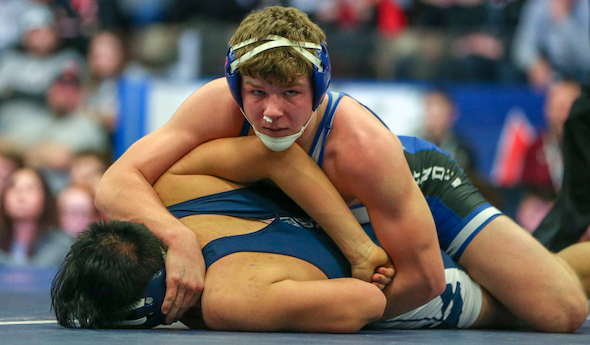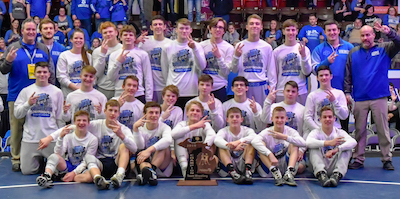
Rematch of Rivals Goes Dundee's Way
February 23, 2019
By Jeff Chaney
Special for Second Half
KALAMAZOO – One of the things that makes the MHSAA Team Wrestling Finals special is that a wrestler can be a hero for his team and make a real difference by taking a "good" loss.
That's exactly what happened for the Dundee Vikings in their Division 3 championship match against familiar foe Richmond on Saturday at Wings Event Center.
With his team down two points, and three matches left to wrestle, Dundee freshman Austin Jaworski stepped on the mat with Richmond junior Austin Kilburn, one of the top Blue Devils.
Suffering a pin would have been damaging, putting the Vikings behind Richmond by eight points with two pairs of evenly-matched wrestlers facing off in the next two matches.
Jaworski battled, and lost to Kilburn 11-5, but no bonus points were surrendered.
Dundee won the next two matches by decision with Tyler Swiderski and Jonathon White, and the Vikings won their second straight Division 3 title and 11th title overall with a 26-25 victory over Richmond.
"I just went out there and did my job," Jaworski said. "I didn't worry about how good he was, I just went out there and wrestled. I did the best I could."
Even though Jaworski may sound humble about what he did for his team, it did not go unnoticed by coach Tim Roberts.
"When Austin Jaworski did his job, and he had a stellar guy he was going against and only gave up three points to them, I felt confident going into those last two," Roberts said. "We didn't know this would come down to the last match. We hoped it would be over before that, but that is the way it goes in duals with good teams."
 And Richmond and Dundee are two good teams.
And Richmond and Dundee are two good teams.
Over the last 13 years, they have wrestled nine times for the Division 3 title. Dundee now has won the last two Finals matchups, and is 5-4 against its rival during that time.
"Every year it comes down to us two," said Roberts, whose team ended with an 18-5 record. "They do such a great job over there. They are a fantastic coached team, and they have a community that is really into it. Their kids work so hard, I have nothing but respect for what they do over there. So when we get a chance to compete with them and win, it feels really good because you beat somebody good."
The lead by either team was more than five points only once during the dual. And the Blue Devils had chances, but were unable to extend the lead when they had it.
"Both teams had their chances," said Richmond co-coach Brandon Day, whose team ended 26-3. "I wouldn't say one kid changed this match one way or another. We have some young guys that did a great job saving bonus, and they had some young guys do the same."
PHOTOS: (Top) Dundee's Stoney Buell works toward a major decision during his championship match bout at 160 pounds Saturday. (Middle) The Vikings celebrate their second straight Division 3 title. (Click for more from HighSchoolSportsScene.com.)

Wrestling’s Next Big Thing
August 13, 2013
“The next big thing” is what marketers often seek. But it’s what school sports administrators usually dread because the “next big thing” is routinely a problem.
And so it is with the sport of wrestling which, at the high school level, has had an admirable record of solving the big issues that have threatened the sport’s existence.
School-based wrestling addressed unhealthy practices for weight loss, first with rules about what could not be done – e.g., rubber suits were banned from practices – and then with rules about what must be done, including a weight management program.
Twenty years ago, MHSAA member schools became one of the early adopters of policies and procedures that include the training of skinfold assessors who are employed to do measurements of all wrestlers, from which each wrestler learns his/her lowest allowed weight and the rate at which he/she may descend to that weight and still remain eligible to compete. These rules, and a nutrition education program, saved interscholastic wrestling from much public criticism and, possibly, from continuing drops in participation.
In addition, the Wrestling Committee has been unique among MHSAA sport committees in recognizing that a season that is too long is neither healthy for nor desired by student-athletes; and the committee has reduced the length of season and number of matches. All of this, combined with the MHSAA team tournament, have greatly increased the sport’s popularity among both participants and spectators.
But in spite of all this, the sport of wrestling is “one communicable skin disease outbreak from extinction,” according to those discussing the state of high school wrestling at a national meeting in June. We’ve already seen an outbreak lead to the suspension of all interscholastic wrestling for two weeks in Minnesota during the 2006-07 school year.
To avoid this next big thing, the rule makers have banned taped headgear, because tape can’t be properly cleaned. The NFHS Sports Medicine Advisory Committee, which is the MHSAA’s advisory body as well, is urging schools to mandate that all participants shower or perform an antiseptic wipe-down after every match.
The MHSAA will make this issue a point of special emphasis in its online, print and face-to-face communications this fall. In addition, an excellent free webinar is provided by the National Wrestling Coaches Association. Click here for the webinar.

